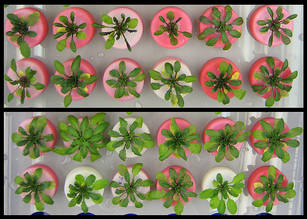Australian scientists have developed a technique to make plants salt-tolerant.
Writing in the leading plant sciences journal The Plant Cell, Adelaide University researcher Professor Mark Tester and his team explain how they have used genetic techniques to increase the activity, in the plant's root tissue, of a gene called HKT1;1.
 "This gene transports sodium out of cells," explains Tester. "So what we've done is to discover a way to increase its expression selectively in the cells that surround the xylem vessels. These are the conduits, like tiny pipes, that carry water and salts from the roots up into the plant shoots. What we have found is that when HKT1;1 activity is increased the plants pump more sodium salts out of the xylem and into specialised stores within the root tissue."
"This gene transports sodium out of cells," explains Tester. "So what we've done is to discover a way to increase its expression selectively in the cells that surround the xylem vessels. These are the conduits, like tiny pipes, that carry water and salts from the roots up into the plant shoots. What we have found is that when HKT1;1 activity is increased the plants pump more sodium salts out of the xylem and into specialised stores within the root tissue."
The result is that much less sodium makes its way up the plant, preventing damage that would normally occur through high sodium causing shoots and leaves to age prematurely.
"This is why plants won't normally grow well on salt-contaminated land because they end up devoting most of their energy to replacing damaged tissues rather than growing. These modified plants, on the other hand, even when cultivated on the equivalent of highly salt-contaminated land, show no ill effects," Tester explains.
The team made the discovery using Arabidopsis, the scientist's plant equivalent of a fruit fly, but will it work in important food crops?
"We've been able to show this this same trick also works in rice, and we're currently testing cereal crops, like wheat, barley and maize at the moment," says Tester. These latter plant groups have turned out to be slightly trickier to work with because the promoter system - the DNA sequence that that team have used to turn on the sodium-pumping gene in Arabidopsis and in rice - does not appear to work the same way in cereals; instead the team have had to identify an alternative way to boost HKT1;1 activity.
The discovery is a major step forward because currently about one third of the world's food is grown on irrigated land, one-fifth of which is now significantly affected by salinity problems. As food demands continue to increase, coupled with the effects of climate change like unreliable rainfall and coastal flooding, the problem is likely to become much worse. Crops that can tolerate conditions like these may be critical in an uncertain future. But are they safe?
"We have checked these plants carefully and there is no evidence that the changes we have made are altering the accumulations of other salts or chemicals within the plant with the exception of a small change to the level of potassium," says Tester. "So we're satisfied that these plants do not pose a threat."










Comments
Add a comment